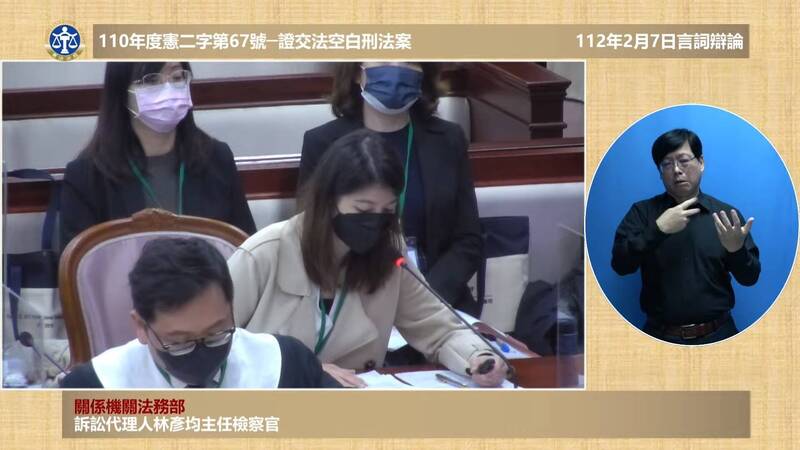Securities and Exchange Act Blank Penal Bill, Constitutional Court oral debate on February 7.
(Photographed by reporter Wu Zhengfeng)
[Reporter Wu Zhengfeng/Taipei Report] Nan Yijun, former chief legal officer of China Development Financial Holdings, Chen Xiangming, former senior deputy manager of strategic planning, and others were accused of violating the mandatory public acquisition regulations of the "Securities Exchange Act" when they participated in the merger and acquisition of Jinding Securities. They were sentenced in 2015 Guilty determined.
Nan Yijun and Chen Xiangming questioned that the Securities and Exchange Act and sub-laws belong to "blank criminal law" and violated the clarity of the law. They petitioned for constitutional interpretation. The Constitutional Court held an oral debate on the 7th, and the verdict is scheduled to be pronounced within 3 months.
Nan and Chen petitioned for the interpretation of the Constitution and argued that the provisions of the Securities and Exchange Law on mandatory public acquisitions authorize the competent authority to formulate administrative orders to supplement decisive elements such as a "certain percentage" that constitutes a criminal offense. In terms of content and content, it lacks specificity and clarity, and belongs to blank authorization, which violates the principle of legality of crime and punishment, clarity of penalty, and clarity of authorization.
Please read on...
The two also believed that the "Administrative Measures for the Public Acquisition of Securities of Publicly Offered Companies", a sub-law authorized by the Securities and Exchange Law, stipulates the detailed rules for mandatory public acquisitions, requiring that "anyone who, alone or jointly with others, plans to acquire the issued shares of a publicly issued company within 50 days If the total amount of shares is more than 20%, it should be done through public acquisition.” Among them, the criminal behavior referred to in “jointly scheduled to acquire within 50 days” is not predictable to the person subject to regulation, and violates the criminal law and the clarity of punishment.
The two said that the relevant regulations did not take into account the use of other equally effective, achievable, and less intrusive administrative penalties, and the penalty was used as a sanction, which has exceeded the necessary level, violated the principle of proportionality and the last resort of penalty, and violated the people Personal freedom, right to work and freedom of contract.
In summary, the two petitioned the Constitutional Court to declare the relevant provisions unconstitutional, and the Attorney General should file an extraordinary appeal.
The Financial Supervisory Commission, the authority in charge of the Securities and Exchange Law, responded that the long-term view of the justices is that the criminal law is not supplemented by authorization. Issuing orders and supplementary legislation is permitted by the Constitution, as long as the comprehensive observation of the parent law and the child law can confirm that the person subject to regulation can be foreseen, and there is no need to achieve certainty that he will be punished, which is in line with legal clarity.
The Financial Supervisory Commission maintains that after overall observation of words such as "jointly scheduled acquisition", "total amount reaching a certain percentage", and "unless certain conditions are met", there is no expansionary interpretation or ambiguity, and there is no violation of the criminal law; legislators formulate relevant regulations And impose criminal penalties to create freedom for legislation. This case is of great importance to the order of the capital market and the maintenance of the legal system. If the judge declares it unconstitutional, it will stretch the provisions of my country's economic criminal law (Security and Exchange Law) and seriously infringe on the public's interest in my country's capital. Trust in the market and norms.
The Ministry of Justice pointed out that there are many "partial blank criminal laws" in the current special criminal law, such as: Pharmaceutical Affairs Law, Infectious Disease Prevention Law, Pesticide Management Law, Water Pollution Prevention Law, Air Pollution Prevention Law, etc. The purpose, content, and scope are specific and clear; the sub-laws enacted by the FSC do not exceed the scope authorized by the parent law; the parent law itself has pointed out the risk areas, which is enough for those regulated to foresee that their behavior may be punished; Should bear a certain degree of legal norms of duty of care.
The Ministry of Justice believes that the claims of the petitioner are just disputes over the legal opinion of the judgment of the individual case, and the dissatisfaction with the court's decision has nothing to do with whether the relevant regulations conform to the legal clarity, and does not involve unconstitutional disputes.
After the verbal debate, the petitioner and the relevant authorities still had no agreement on whether the relevant regulations were clear. At the end of the court, the President of the Judiciary and the presiding judge of the Constitutional Court, Xu Zongli, informed that the judgment of the whole case is scheduled to be pronounced within 3 months, and may be extended by 2 months if necessary. .
